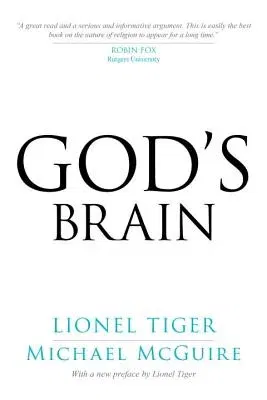Taking a perspective rooted in evolutionary biology with a focus on
brain science, two distinguished authors radically alter the fractious
debate on the existence of God and the nature of religion. Two
distinguished authors, renowned anthropologist Lionel Tiger and
pioneering neuroscientist Michael McGuire, elucidate the perennial
questions about religion: What is its purpose? How did it arise? What is
its source? Why does every known culture have some form of it? Their
answer is deceptively simple, yet at the same time highly complex: The
brain creates religion and its varied concepts of God, and then in turn
feeds on its creation to satisfy innate neurological and associated
social needs. Brain science reveals that humans and other primates alike
are afflicted by unavoidable sources of stress that the authors describe
as brainpain. To cope with this affliction people seek to brainsoothe.
We humans use religion and its social structures to induce brainsoothing
as a relief for innate anxiety. How we do this is the subject of this
groundbreaking book. In a concise, lively, accessible, and witty style,
the authors combine zoom-lens vignettes of religious practices with
discussions of the latest research on religion's neurological effects on
the brain. Among other topics, they consider religion's role in
providing positive socialization, its seeming obsession with regulating
sex, the common biological scaffolding between nonhuman primates and
humans and how this affects religion, and evidence that the palliative
effects of religion on brain chemistry are not matched by nonreligious
remedies. In a new preface to the paperback edition, Lionel Tiger
discusses the paradoxical effects of religion-on the one hand, producing
masterpieces of art and architecture and, on the other, fueling violence
throughout history and into the present. This fascinating book provides
key insights into the complexities of our brain and the role of
religion, perhaps its most remarkable creation.

